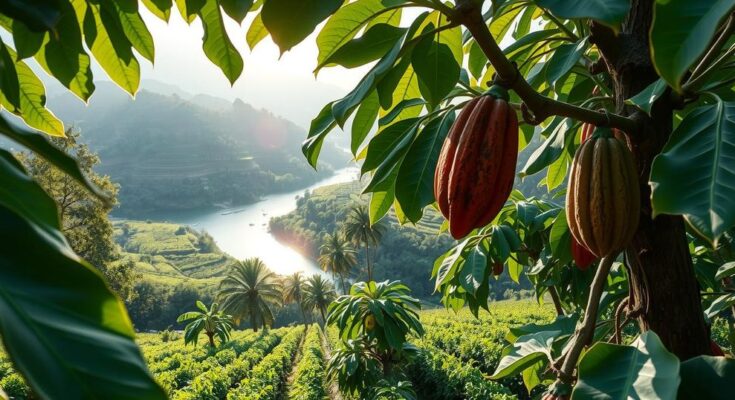The EU and Japan will commence heavy metal testing on Ghana’s cocoa exports in September 2024 due to concerns over contamination from illegal mining. This development poses a threat to Ghana’s cocoa industry, warranting urgent protective measures. Dr. Randy Abbey of COCOBOD highlighted the need for significant investment in testing laboratories to comply with these new standards.
The European Union (EU) and Japan are set to begin testing for heavy metals in cocoa exports from Ghana starting in September 2024. This initiative arises due to growing concerns over contamination linked to illegal mining activities in cocoa-growing regions. The decision may have significant ramifications for Ghana’s cocoa trade, especially in major export markets that prioritize food safety and quality standards.
Dr. Randy Abbey, the acting Chief Executive Officer of the Ghana Cocoa Board (COCOBOD), addressed the issue during a conference with Members of Parliament and industry stakeholders. He emphasized that illegal mining poses a serious threat to the cocoa industry and called for immediate action to safeguard Ghana’s status as a leading cocoa producer. He noted, “The European Union and Japan have indicated that from September this year, they will begin testing for heavy metals, especially nickel, in our cocoa.”
Dr. Abbey highlighted that the growing emphasis on heavy metal testing could undermine the premium status of Ghana’s cocoa, which commands higher prices in international markets. He expressed concerns about stringent regulations set to follow from North America and parts of Asia, which will intensify the pressure on Ghana’s cocoa exports. “The premium status of our cocoa, which gives us extra money, is under serious threat because they are starting with nickel,” he cautioned.
Additionally, he pointed out the financial implications of meeting these new testing requirements. COCOBOD will need to invest significantly in establishing advanced laboratories at their Quality Control Center in Tema to comply with heavy metal testing mandates. Dr. Abbey stated, “As a result of this, COCOBOD will have to spend significant amounts of money to set up state-of-the-art laboratories to meet the standards and test for these heavy metals.”
With international buyers tightening regulations around cocoa exports, Ghana must address the environmental damage inflicted by illegal mining to maintain its cocoa export integrity. The emphasis on testing for heavy metals reflects a wider trend towards ensuring quality and safety in food production, placing Ghana’s cocoa industry under increasing scrutiny.
In summary, the EU and Japan’s decision to test for heavy metals in Ghana’s cocoa exports poses a significant challenge for the cocoa industry. Dr. Abbey has called for urgent measures to combat the effects of illegal mining which threatens the market standing of Ghana’s cocoa. The financial burden on COCOBOD to adapt to these new regulations underscores the need for immediate action to reinforce Ghana’s position in the global cocoa trade.
Original Source: citinewsroom.com




